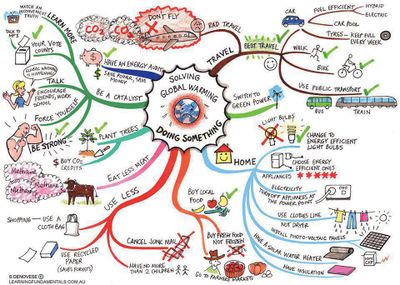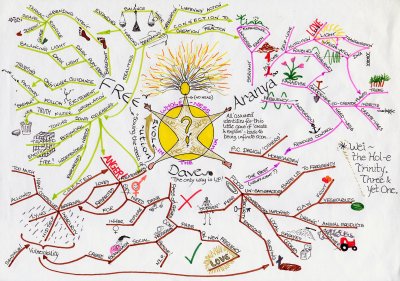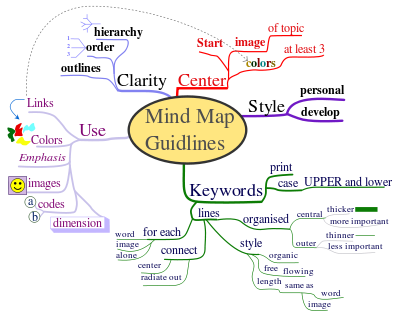Difference between revisions of "Mind map"
(it's a good example of a mindmap tho) |
m (→Free mind-mapping tools) |
||
| Line 15: | Line 15: | ||
*[http://sourceforge.net/projects/freemind/ FreeMind] | *[http://sourceforge.net/projects/freemind/ FreeMind] | ||
*[http://www.evernote.com/ Evernote] | *[http://www.evernote.com/ Evernote] | ||
| − | *[http://www.mindmeister.com/ MindMeister] | + | *[http://www.mindmeister.com/ MindMeister] ''- online collaborative tool'' |
== Proprietary tools == | == Proprietary tools == | ||
Latest revision as of 15:36, 5 October 2014
A mind map is a diagram used to represent words, ideas, tasks, or other items linked to and arranged around a central key word or idea. Mind maps are used to generate, visualise, structure, and classify ideas, and as an aid to studying and organising information, solving problems, writing, and group decision-making, and writing.
The elements of a given mind map are arranged intuitively according to the importance of the concepts, and are classified into groupings, branches, or areas, with the goal of representing semantic or other connections between portions of information. Mind maps may also aid recall of existing memories since they are a reflection of the mental associations that make up our concepts. Below are a couple of typical examples showing a hand-drawn one and one made with a mind-mapping software application.

|

|

|
The mind map can be contrasted with the similar idea of concept mapping. The former is based on radial hierarchies and tree structures denoting relationships with a central governing concept, whereas concept maps are based on connections between concepts in more diverse patterns.
Free mind-mapping tools
- FreeMind
- Evernote
- MindMeister - online collaborative tool
Proprietary tools
- TheBrain
- MindJet
- NovaMind
- http://www.cayra.net/ - (site down or too slow, did not read) Requires XP SP2 or Vista
- http://www.imindmap.com/strategies
- OpenMind 2 Business offers the holy grail of mind mapping and project management. Convert maps to outlines, Gantt charts, timelines, export to Word, Outlook, PowerPoint, HTML, import from those same programs
- Cmap - concept mapping. Concept Mapping Software for Windows, Mac, Linux and Sparc. Memletics' concept mapping ebook is a great companion to this software.
See also
- mind mapping strategies
- http://www.mind-mapping.org/ - complete list of mind mapping software resources.
- Evernote-Livescribe
- Prezi
- Cynapse
- Gephi
- Graphvis
- Prefuse







